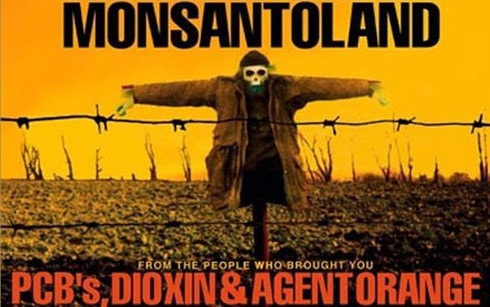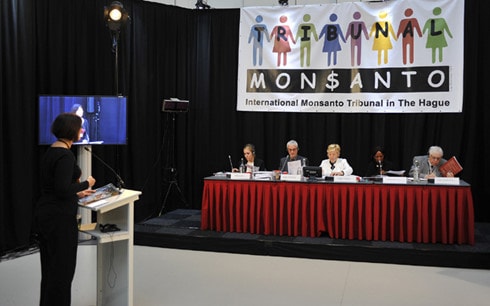Breakthrough in Justice: Trial of Monsanto's Crimes - Transnational Corporation
The ruling by the Monsanto International Tribunal is not binding but is an important precedent for future legal battles with multinational corporations.
Below is a summary of some information from the official website of the International Court of Justice in The Hague about Monsanto:
On April 18, 2017, professional judges announced their conclusions in The Hague (Netherlands) on the world-famous Monsanto corporation case.
“The Crimes of a Transnational Corporation”
More and more people around the world are becoming aware that Monsanto is the embodiment of industrial agriculture. To them, the company’s chemical production practices pollute the environment, accelerate biodiversity loss, and contribute significantly to global warming.
 |
| The Monsanto agrochemical corporation is a nightmare for many people around the world. Photo: directaction.org.au. |
Since the early 20th century, the US-based Monsanto Company has developed a number of highly toxic products that have caused lasting damage to the environment and caused illness and death to thousands of people.
These deadly products include: (1) PCBs – one of 12 persistent organic pollutants that affect human and animal fertility, (2) “2,4,5 T” – an acid containing dioxin and a constituent of the defoliant Agent Orange that the US military sprayed in Vietnam during the war, a poison that continues to cause birth defects and cancer to this day, (3) the herbicide Lasso, now banned in Europe, and (4) RoundUp – the most widely used herbicide in the world and the cause of the biggest health and environmental scandals in modern history.
Tricks
According to critics, Monsanto relies on a systematic cover-up strategy to ignore the harm to people and the environment caused by its products.
Monsanto's tactics include: lobbying regulators and governments, lying, funding fake scientific research, pressuring independent scientists, manipulating the media...
According to the Monsanto Tribunal, the company's history provides a textbook example of impunity and criminality, benefiting transnational corporations and their executives, contributing to the climate and biosphere crises, and threatening the safety of the planet.
Currently, under existing law, it is not possible to criminally prosecute a company like Monsanto or its leadership for crimes against human health and environmental integrity.
Every year, Monsanto spends huge sums of money defending themselves.
International Tribunal on Monsanto - new breakthrough
The court's hearings took place in The Hague (Netherlands) from October 15-16, 2016 to assess the allegations against Monsanto and determine the damages caused by this transnational company.
During the proceedings, five internationally renowned judges heard presentations from 30 witnesses and experts from five continents. Their legal opinions were published on April 18.
The overall aim of the tribunal is as follows: To reach a judgment (albeit a symbolic one) against Monsanto, by a real panel of judges, after substantive proceedings in an international court, thereby contributing to the establishment of international mechanisms to bring justice to victims of multinational corporations.
The specific objectives of the court are: (1) to assess the Monsanto case and the damages caused by the company in accordance with international law; (2) to assess Monsanto's conduct in relation to ecocide, proposing to include this crime in the International Criminal Law (the Global Citizens Movement has called for the inclusion of this crime in international criminal law); and (3) to consider amending the Rome Statute, creating a legal basis for prosecuting both natural and legal persons suspected of this crime.
The court's working groups examined Monsanto's impacts in six areas: (1) the right to a healthy environment, (2) the right to health, (3) the right to food, (4) freedom of expression and academic research, (5) complicity in war crimes, and (6) ecocide.
 |
| Monsanto Tribunal hearing on October 15, 2016. Photo: Monsanto Tribunal. |
The legal basis of the court is: (1) the United Nations Guiding Principles on Business and Human Rights, adopted by the United Nations Human Rights Council in June 2011, and (2) the Rome Statute establishing the International Criminal Court (ICC), which gives the court jurisdiction to try those accused of genocide, crimes against humanity, war crimes, and the crime of aggression.
The above-mentioned initial Guiding Principles make it clear that companies must respect all human rights, including the right to life, the right to health and the right to a clean natural environment.
Members of civil society from various professions with specialized knowledge related to the issues in the trial took the initiative to organize this Court. Students from several universities also contributed to this process.
The Monsanto case serves as a landmark case for the Court to consider this issue. The Monsanto court’s conclusions provide a comprehensive legal record that will serve as precedent for future lawsuits against Monsanto and similar chemical companies./.
According to VOV

